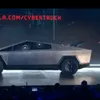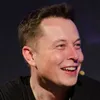Elon Musk hands over first batch of Made-in-China Teslas to early buyers in Shanghai
Tesla’s Gigafactory in Shanghai was constructed in a record 12 months and produces battery cells, Tesla Model 3, and Model Y.
Tesla CEO Elon Musk presented the first batch of Made-in-China cars to ordinary buyers on Tuesday in a milestone for the company's new Shanghai "giga-factory", but which comes as sales decelerate in the world's largest electric-vehicle market.
The eccentric entrepreneur danced awkwardly, gave out high-fives, and mugged on a stage as sleek Model 3 sedans -- the company's mid-price, mass-market offer -- were driven up to one by one and presented to buyers who jumped into the back seats before being driven away at the plant.
The factory is the company's first outside the United States and a key step forward in Musk's strategy of going global. Musk said it was just the start of what will be a growing investment in China by the California-based electric-vehicle pioneer.
"We intend to continue making a significant investment and increasing that investment in China, by making the Model 3 and the Model Y, and future models also in China," he said.

Musk, 48, said Tesla also planned to establish "a China design and engineering centre to actually design an original car in China for worldwide consumption."
Tesla has said the multi-billion-dollar plant is producing more than 1,000 vehicles per week. It has already delivered a small batch of Model 3s on December 30 to employees who had pre-ordered them. Those being driven away at Tuesday's event were the first for regular consumers.
The giga-factory is unusual for China, which typically requires foreign automakers to forge manufacturing joint ventures with domestic firms, which means sharing profits and technology with local partners. But amid sustained US pressure on China to open its markets, that requirement was waived for the Shanghai assembly line, which is wholly-owned by Tesla and believed to be the first to enjoy that status.
Musk has said that the plant would eventually have an annual production capacity of 500,000 vehicles, and has billed it as the solution to the company's perennial struggles with production delays and failure to keep up with demand.
Tesla's output woes in the US are easing however, with the company reporting that 2019 deliveries surged 50 percent year-on-year to 367,500. But China's auto market has slowed significantly since plans for the Shanghai factory began to take shape more than 18 months ago.
After surging to become the world's largest automotive market, sales fell last year for the first time since the 1990s amid a slowing economy, US trade tensions, and a Chinese credit crackdown that has crimped car-financing channels.

Sales of "new-energy vehicles" such as electric models have particularly suffered, plunging nearly 44 percent in November, the fifth straight month of contraction, after the government slashed subsidies for such cars earlier last year.
Several automotive analysts have said Tesla could struggle to measure up to Musk's promises for Shanghai output. But at more than $450 per share, Tesla's stock is at record highs, having more than doubled since June on improving output and earnings.
Morgan Stanley said in late December that Tesla shares were positioned for a "potential surge" through the middle of 2020 due to the Shanghai factory coming online and other potentially positive catalysts.
(Edited by Suman Singh)









